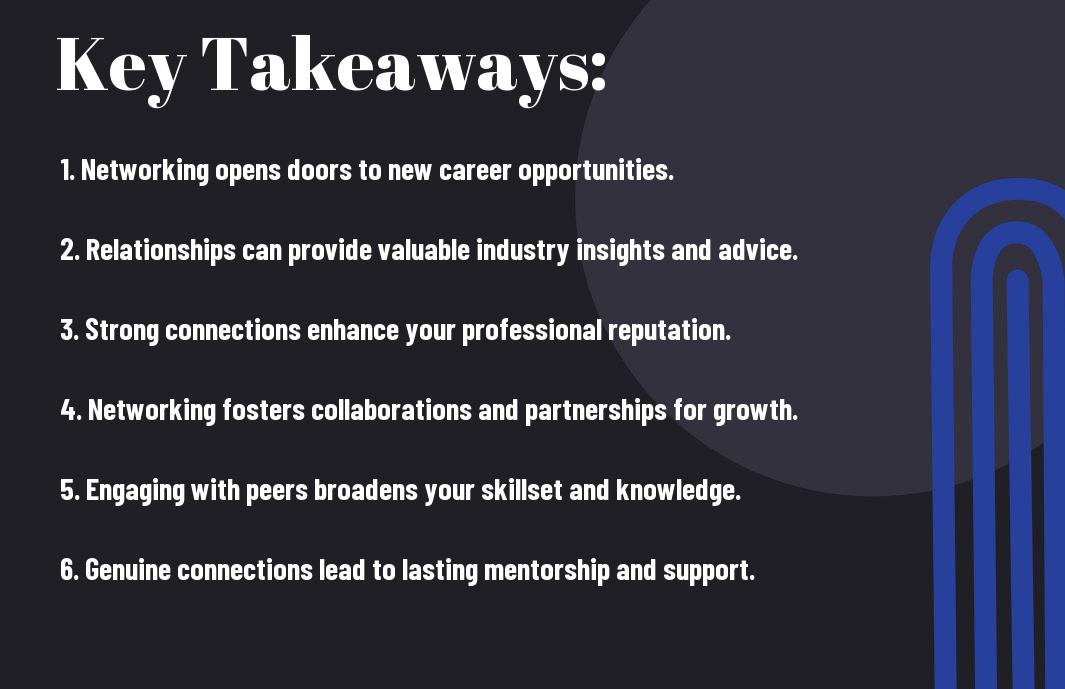
There’s no denying that networking plays a vital role in shaping your career trajectory. Engaging with professionals in your industry can open doors to opportunities, provide invaluable insights, and enhance your skill set. By building a robust network, you not only gain access to job leads and mentorship but also cultivate relationships that can support your growth over time. Understanding how to effectively network will empower you to take charge of your professional journey and reach your career goals with confidence.

Understanding Networking
Before you can excel in your career, it’s important to grasp the significance of networking. Networking is more than just exchanging business cards; it is about building meaningful relationships that can enrich your professional life. Understanding the dynamics and advantages of networking will enable you to leverage these connections for career growth.
Definition of Networking
Understanding networking involves recognizing it as the process of establishing and nurturing professional relationships. It allows you to share resources, advice, and opportunities with others in your field.
Types of Networking
There are several types of networking that you can engage in to enhance your career prospects. Here are some key categories:
- Personal Networking
- Professional Networking
- Online Networking
- Strategic Networking
- Community Networking
Assume that each type of networking offers unique benefits and can lead to various opportunities in your career journey.
| Type of Networking | Description |
| Personal Networking | Building relationships through social interactions. |
| Professional Networking | Connecting with individuals in your industry. |
| Online Networking | Using social media and online platforms. |
| Strategic Networking | Establishing connections with specific goals in mind. |
| Community Networking | Engaging with local organizations and events. |
With the various types of networking available, you should assess which methods align with your career goals and personal style. Consider diversifying your approach to maximize opportunities.
- Participate in local events
- Utilize professional associations
- Engage with online forums and groups
- Attend industry conferences
- Reach out to mentors
Assume that actively engaging in these networking types will expand your reach and enhance your professional visibility.
| Networking Type | Potential Benefit |
| Personal Networking | Build a supportive personal circle. |
| Professional Networking | Access job opportunities and collaboration. |
| Online Networking | Engage with a global audience. |
| Strategic Networking | Achieve specific career objectives. |
| Community Networking | Create local connections for collaboration. |
The Benefits of Networking
One of the most significant advantages of networking is the access it provides to countless career opportunities. By building relationships with professionals in your field, you can discover job openings, mentorship programs, and other pathways that might not be publicly advertised. Your connections can introduce you to influential decision-makers, helping you to stand out in a competitive job market and advance your career to new heights.
Career Opportunities
About 70% of jobs are found through networking, illustrating the power of building strong professional relationships. When you connect with others in your industry, you become privy to hidden job markets, insider information about company cultures, and potential referrals that enhance your chances of landing your dream job. Your network serves as a resource for exploring various career paths and making informed decisions about your future.
Skill Development
One vital aspect of networking is the opportunity for skill development. Engaging with experienced professionals allows you to gain insights and knowledge that are invaluable for your personal and professional growth. You can learn about industry trends, new technologies, and best practices that can enhance your skill set and keep you competitive in your field.
Plus, participating in networking events or workshops enables you to practice and enhance your communication and interpersonal skills. By interacting with diverse individuals, you expand your understanding and adaptability, which are crucial traits in any career. Building these skills through networking not only boosts your confidence but also prepares you for greater challenges in your professional journey.
Building a Strong Professional Network
Unlike the traditional belief that success is solely based on individual efforts, building a strong professional network opens doors to new opportunities and insights. Your connections can provide guidance, referrals, and support that enhance your career trajectory. Cultivating these relationships takes time and intention, but the rewards often surpass the effort. Every person you meet has the potential to influence your future, so investing in genuine connections is necessary for growth and success.
Identifying Key Contacts
About identifying key contacts, it’s necessary to focus on individuals who align with your career goals and interests. Look for mentors, industry leaders, and peers that share similar aspirations or can offer valuable insights. These connections can provide support and help you navigate your path. Prioritize quality over quantity; having a few key relationships can often be more beneficial than having a large network with negligible connection.
Effective Networking Strategies
An effective networking strategy goes beyond just collecting business cards. Engage meaningfully with your contacts by offering assistance, sharing knowledge, and being genuinely interested in their work. Utilize social media platforms like LinkedIn to connect and follow up on conversations. Attend industry events, and don’t hesitate to reach out through informational interviews. The key is to approach networking with a mindset of collaboration and support rather than purely transactional relationships.
In fact, fostering strong ties within your network involves maintaining communication and showing appreciation. Regularly check in with your contacts, share interesting content, and celebrate their successes. This proactive approach builds trust and keeps you at the forefront of their minds when opportunities arise. Engaging in genuine and reciprocal relationships sets a foundation for collaboration and career growth as you leverage the collective strengths and insights of your network.
Leveraging Social Media for Networking
After recognizing the importance of networking, you can harness the power of social media to expand your professional connections. Platforms like LinkedIn, Twitter, and Instagram offer unique opportunities to engage with industry leaders, share your expertise, and connect with like-minded individuals. By actively participating in discussions, sharing valuable content, and reaching out to potential collaborators, you can effectively build a robust professional network that will support your career growth.
Choosing the Right Platforms
Along with understanding your networking goals, you need to identify the social media platforms that align with your industry and target audience. LinkedIn is ideal for professional connections, while Twitter is great for real-time conversations and insights. Instagram can showcase your creativity and personal brand, making it suitable for those in visual industries. Choose the platforms that best fit your profession and where your desired connections are most active.
Building an Online Presence
Before submerging into networking, focus on creating a strong online presence that reflects your professional identity. This includes curating your social media profiles, sharing relevant content, and engaging authentically with your audience. Your online persona should consistently showcase your skills, interests, and career aspirations, allowing potential connections to recognize your expertise and authenticity.
Presence in the digital space plays a significant role in attracting opportunities and connections. Regularly updating your profiles, sharing insights from your industry, and showcasing your projects can enhance your visibility. Engaging with others by commenting on their posts or sharing valuable feedback fosters relationships and positions you as an active participant in your field. A well-maintained online presence demonstrates your professionalism and commitment, making it easier for others to connect with you and expand your networking opportunities.
Maintaining Relationships
Keep in mind that networking is an ongoing process. It’s important to regularly check in with your contacts to sustain and strengthen your relationships. A simple message or a quick call can help keep the lines of communication open, ensuring you stay relevant in their minds and fostering mutual support in your professional journey.
Follow-Up Techniques
One effective follow-up technique is to send a personalized message after meeting someone new. Reference a specific topic or detail from your conversation to show genuine interest. This small gesture can leave a lasting impression and set the foundation for a strong relationship.
Nurturing Connections
By consistently engaging with your network, you solidify the bonds you’ve created and help them flourish. Regularly share relevant articles or invite connections to events that align with their interests, demonstrating that you value their professional growth as much as your own.
To nurture connections effectively, schedule time each month to reach out to different individuals within your network. Attend industry meetups, workshops, or online webinars, and actively engage with your contacts on social media. This will allow you to not only keep your relationships alive but also to grow them organically over time, creating opportunities for collaboration and support in your career.
Networking in Different Industries
Once again, it’s imperative to recognize that effective networking strategies can vary significantly between industries. Understanding the unique dynamics of your field will allow you to tailor your approach and connect more meaningfully with professionals who share your interests and goals. Whether you’re in tech, healthcare, or finance, being aware of industry norms and expectations can enhance your networking efforts and open doors that are specifically relevant to your career path.
Industry-Specific Approaches
Approaches to networking can greatly differ depending on the industry you operate in. For instance, in technology, online platforms and industry conferences play an imperative role in facilitating connections, while in more traditional sectors like finance, face-to-face meetings and referrals may hold greater significance. By aligning your networking strategies with industry practices, you can maximize your opportunities and foster valuable relationships.
Adapting to Cultural Differences
Along with industry norms, adapting to cultural differences is vital for successful networking. Each industry may have distinct cultural cues that influence how relationships are built and maintained. Being attuned to these nuances enables you to engage effectively and respectfully with diverse individuals in your professional network.
With globalization and the rise of remote work, you may encounter varied cultural contexts, even within the same industry. Familiarizing yourself with these cultural differences is key to building rapport and trust. This could mean understanding communication styles, decision-making processes, and meeting etiquettes specific to different cultures. By taking the time to learn and adapt, you can bridge potential gaps and foster stronger connections across diverse networks, which can significantly enhance your career prospects.
Summing up
To wrap up, effective networking is crucial for building a successful career. It enables you to connect with industry professionals, discover new opportunities, and gain insights that can enhance your skills. By fostering meaningful relationships and maintaining connections, you position yourself to leverage support and resources throughout your career journey. Embrace networking as an ongoing process, and invest time in nurturing these relationships; they can significantly impact your professional growth and open doors you might not have otherwise encountered.
Leave a Reply